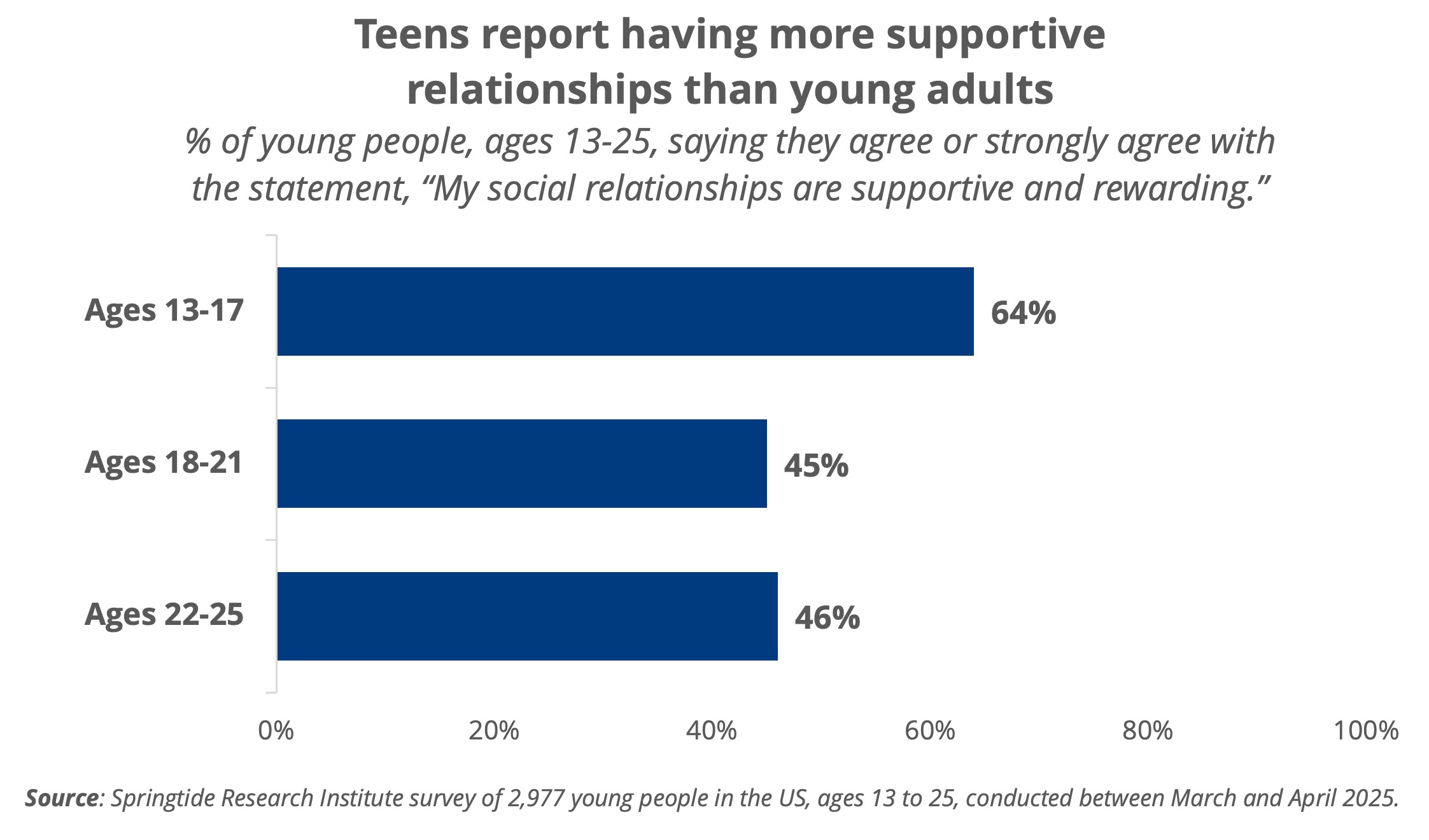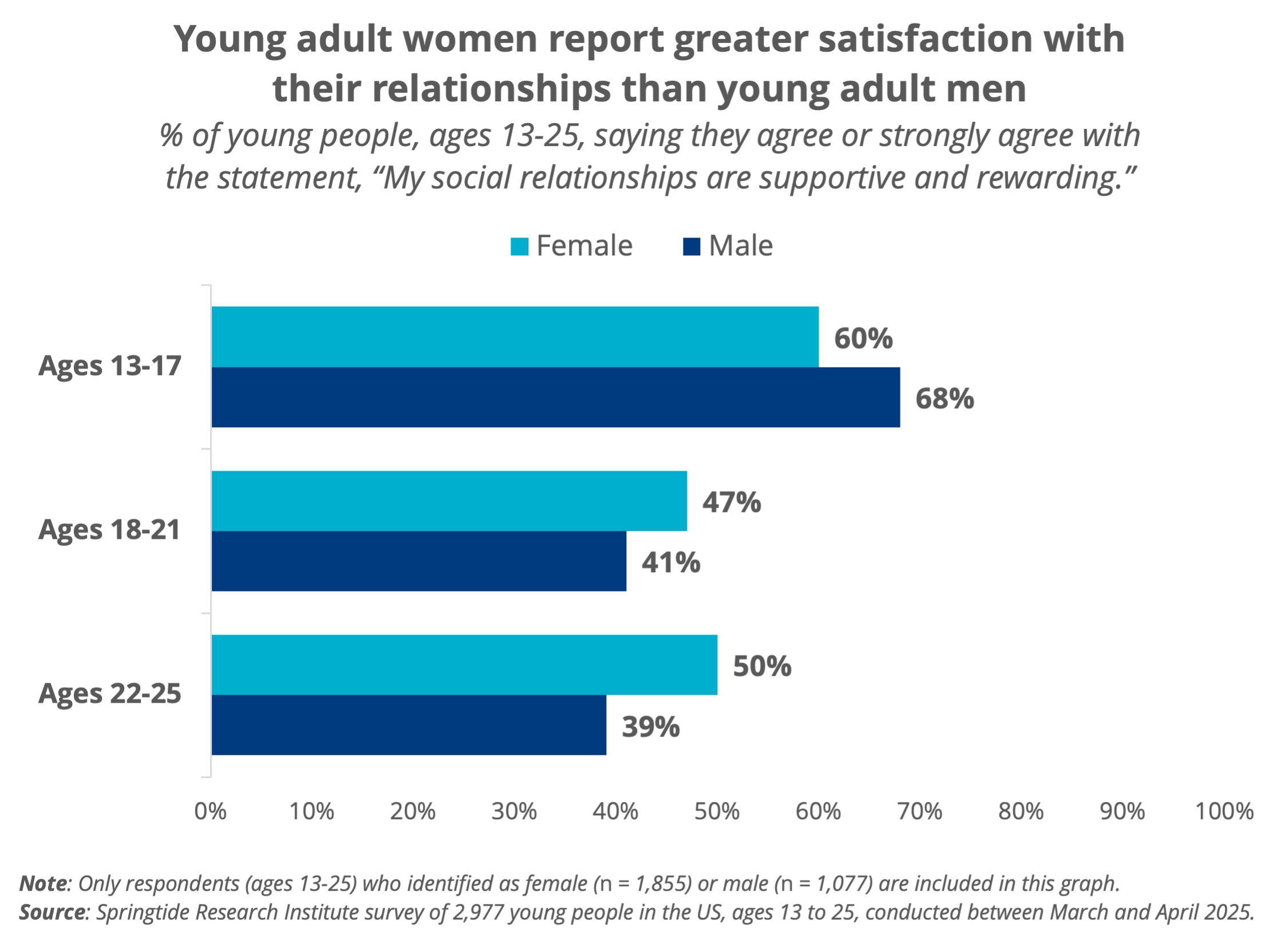
Does gender influence loneliness in young people?
Age and gender both play a role in young people’s experiences of loneliness
Data from Springtide’s 2025 Study of Young People’s Organizational Involvement show age and gender both play a significant role in young people’s experiences of loneliness. Small differences emerge within age groups based on gender, but age comparisons reveal significant decreases in supportive relationships for both men and women in the transition to adulthood.
Overall, young people ages 13-25 generally report satisfaction with their relationships. In response to the statement, “My social relationships are supportive and rewarding,” 55% agree or strongly agree, with an additional 22% saying that they slightly agree. Just under half (47%) of all respondents say they “hardly ever” lack companionship.
Teens report being less lonely than young adults
Over two-thirds (64%) of 13–17-year-olds agree or strongly agree that their relationships are supportive and rewarding. This declines by 19 percentage points once respondents reach adulthood: 45% of 18–21-year-olds agree or strongly agree, and 46% of 22–25-year-olds agree or strongly agree.

Less than half (42%) of 13–17-year-olds say they lack companionship “some of the time” or “often.” This increases by over 20 percentage points for 18–25-year-olds. Two-thirds (66%) of 18–21-year-olds and 63% of 22–25-year-olds say they sometimes or often lack companionship.

How gender impacts loneliness in young people
Loneliness among young people changes with age, but it also differs by gender. At some ages, girls report feeling lonelier than boys, while at other ages the difference is smaller or even reversed. This suggests that gender shapes young people’s experiences of loneliness in ways that shift in the transition to adulthood.
For teens ages 13-17, 44% of girls say they lack companionship “some of the time” or “often” compared to 40% for boys. This 4-percentage point gap widens to 6% for 18–21-year-olds, with 67% of young women and 61% young men reporting sometimes or often lacking companionship. This relationship flips for 22–25-year-olds, where 61% of women and 67% of men say they lack companionship. Both 18–21 and 22–25-year-olds across genders report a significant increase in lack of companionship compared to 13–17-year-olds.

Similarly, when asked to respond to the statement: “My social relationships are supportive and rewarding,” 60% of girls ages 13–17 and 68% of boys ages 13–17 agree or strongly agree. Among young men, agreement with the statement trends downward across age groups, dropping to 41% for 18–21-year-olds and further decreasing to 39% for 22–25-year-olds. For young women, agreement with the same statement decreases to 47% for 18–21-year-olds, but increases to 50% among 22–25-year-olds.

Conclusion
Data from Springtide’s new 2025 Study on Young People’s Organizational Involvement show that age and gender play a significant role in experiences of loneliness. Teen girls are slightly more lonely than teen boys, and both young men and women experience a decrease in supportive relationships in the transition to their twenties. Yet among young adults, women are slightly less lonely than men. These findings indicate there are life stages where loneliness among young people differ based on gender, raising questions about how men’s and women’s relationships develop and shift with age.
Note: The survey and interview data featured in this Data Drop come from Springtide Research Institute’s 2025 Study of Young People’s Organizational Involvement. Springtide surveyed a sample of 2,977 young people in the US, ages 13–25, and interviewed an additional 51 in depth. See survey responses in the topline survey results and review methodology here.



